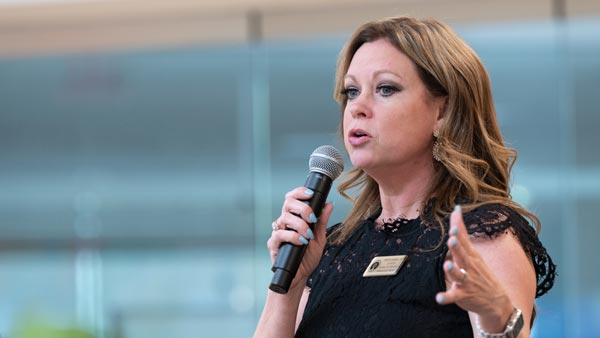“We need to foster collaboration in healthcare,” Kirsten Hokeness, PhD, director of Bryant University’s School of Health and Behavioral Sciences, told an engaged audience of practitioners at the Bryant Healthcare Summit. Held May 6 in the university’s Academic Innovation Center — an appropriate setting for an event designed for real-time problem-solving among industry changemakers — the day included keynotes, collaborative sessions, and networking opportunities for attendees.
“You are part of history,” Bryant University Provost and Chief Academic Officer Rupendra Paliwal, PhD, said during his opening remarks at the inaugural summit, which was sponsored by Abacus Health Solutions, Blue Cross Blue Shield of Rhode Island, CVS Health, Neighborhood Health Plan of Rhode Island, Ortho Rhode Island, Providence Business News, and the Rhode Island Foundation.
The first keynote lecture, presented by CVS Retail Health Senior Vice President and Associate CMO David Fairchild, MD, MPH, covered the future of healthcare delivery.
“We’ve learned through the pandemic that convenience is important to patients and providers,” said Fairchild, who also serves as the chief medical officer for MinuteClinic, a division of CVS Health that provides retail clinic services in more than 1,100 locations across 33 states and the District of Columbia.
“Engagement leads to better health outcomes, and better outcomes will lower the cost of healthcare.”
While CVS has access to primary care providers, Fairchild said, they haven’t yet made inroads with hospitals. He sees this as an opportunity for collaboration with systems such as Southcoast Health – and a means to improve healthcare for all.
“Engagement leads to better health outcomes, and better outcomes will lower the cost of healthcare,” he told the audience.
Southcoast Health CEO Rayford Kruger, MD, echoed Fairchild’s emphasis on convenience in healthcare during his keynote presentation. He also discussed provider shortages, arguing that the seeds for inadequate staffing were planted before the pandemic; providers often left due to stress and lack of management.
“We came incredibly close to rationing healthcare,” he said, adding that higher education institutions, such as Bryant, can help alleviate staffing pressures through professional development and leadership programs. Bryant’s Physician Assistant and Nurse Practitioner Leadership in Healthcare Certificate is one such option.

In the third keynote of the morning, David Ahern, PhD, spoke about his work as director of the Digital Behavioral Health and Informatics Research Program at Brigham and Women’s Hospital. Ahern, an assistant professor of psychology at Harvard Medical School and founder/senior scientist of Abacus Health Solutions, framed behavioral medicine as an advanced approach to behavior change through his research on obesity and diabetes.
We need to redefine obesity as a disease, not a problem of character, Ahern argued. Providers should also emphasize food as medicine, an approach he’s taken in his own life with a plant-based diet.
Following the keynotes, summit attendees joined collaborative sessions on the purpose of healthcare led by former Rhode Island Department of Health Director Michael Fine, MD; biopsychosocial care for chronic pain, led by Bryant Biological and Biomedical Sciences Chair Jennifer Hurrell, PT; racial and socioeconomic barriers to healthcare, led by Rhode Island Free Clinic CEO Forrest Daniels, MPA, DsC, FACHE; and the role of healthcare informatics to improve quality of care, led by Brown University Center for Biomedical Informatics Director Indra Neil Sarkar, PhD, MLIS, FACMI.
Attendees reconvened for lunch and two additional lectures in the Academic Innovation Center Forum. In his introduction, Bryant’s Peter Kirk, MD, described first afternoon keynote Jessica Pelletier, DO, as “an exceptionally talented, wonderful human being” who would lead the audience in a discussion on the social determinants of health, including education, food security, housing and others.
“Our zip code determines our health more than our clinician can,” Pelletier said. Nevertheless, she added, “we’re in a unique position as clinicians and healthcare-adjacent individuals to touch our clients’ lives” by treating the whole person, not just the disease.
“If we’re practicing in siloes, we miss the opportunity to attend to suffering when it’s happening."
For the final keynote of the afternoon, Associate Director of the School of Health and Behavioral Sciences and Psychology Chair Joe Trunzo, PhD, introduced John Todaro, PhD, cofounder of Providence Behavioral Health Associates, who emphasized the importance of behavioral health integration in primary care settings — a benefit for both patient and provider.
“If we’re practicing in siloes, we miss the opportunity to attend to suffering when it’s happening,” he told the audience.
An advocate for integrated care, Todaro, an associate clinical professor of psychiatry and human behavior at Brown University, is also critical of the fee for service payment model, which doesn’t work for behavioral health.
“We need to find a way to fund this properly; it’s the million-dollar question,” he said.
Following Todaro’s lecture, attendees spread across the Academic Innovation Center for more collaborative discussions on the impact of climate change on healthcare, led by Harvard’s Kimberly Humphrey, MD, MPH; the state of healthcare access legislation in Rhode Island, led by Mayforth Group Chairman Rick McAuliffe; physical therapy as a doctoring profession, led by Highbar CEO Michelle Collie, PT, DPT, MS; and physician assistant integration into subspecialty fields to alleviate talent shortages, led by Bryant PA Program Director Ashley Hughes, MSPAS, PA-C.
Attendees finished the day with more collaboration over cocktails at Bello Grand Hall.
To learn about Bryant’s School of Health and Behavioral Sciences, visit Bryant.edu/shbs.